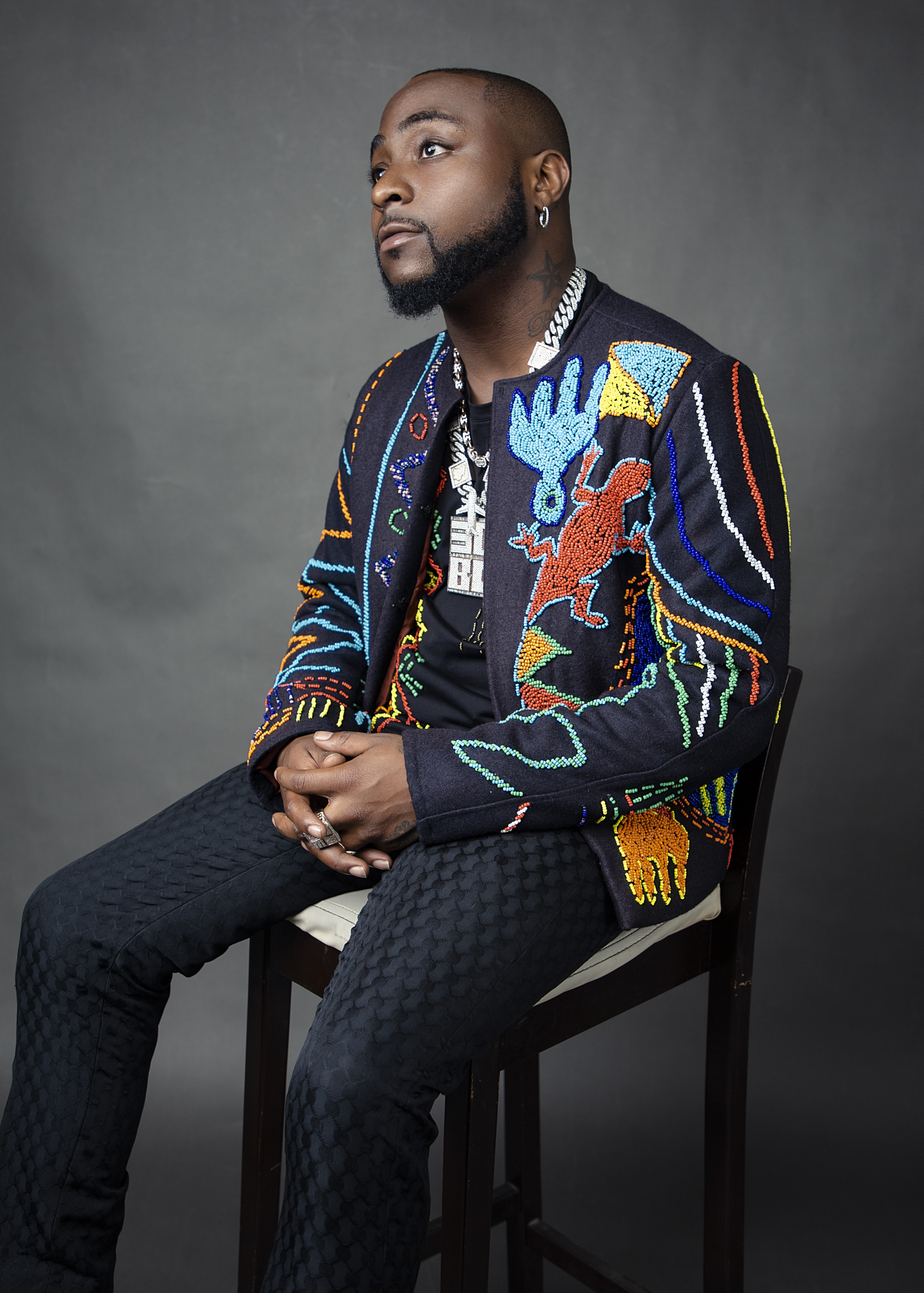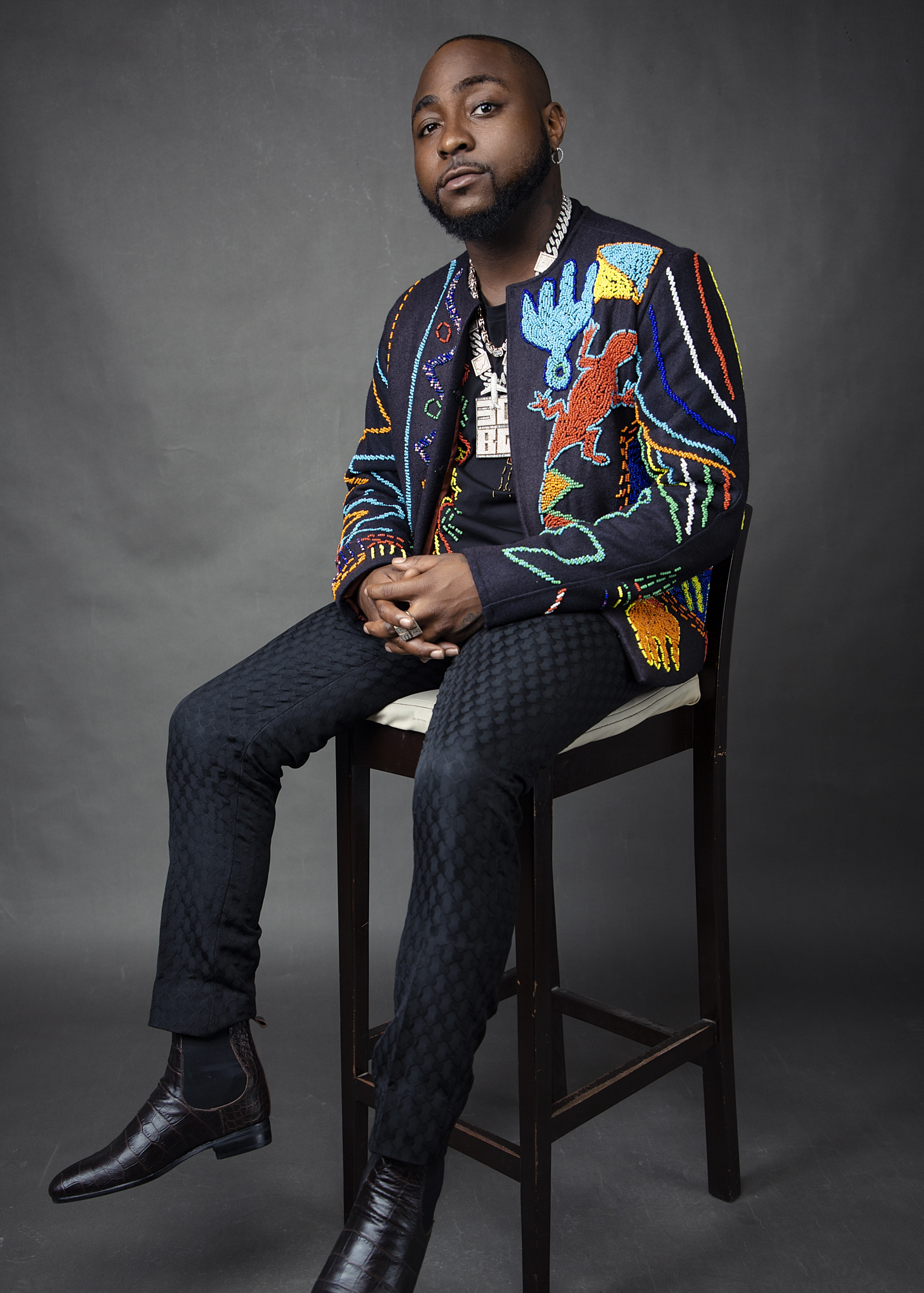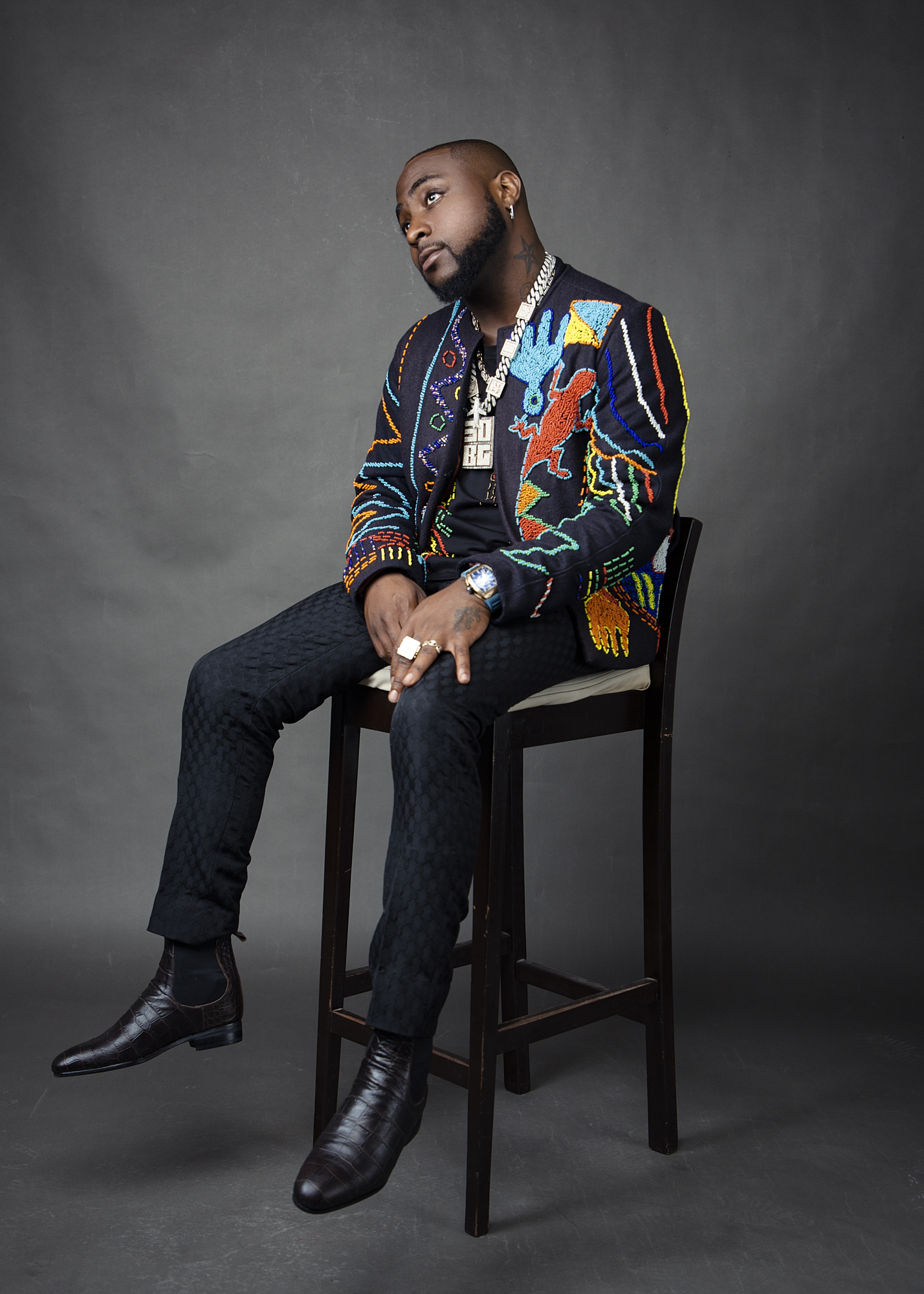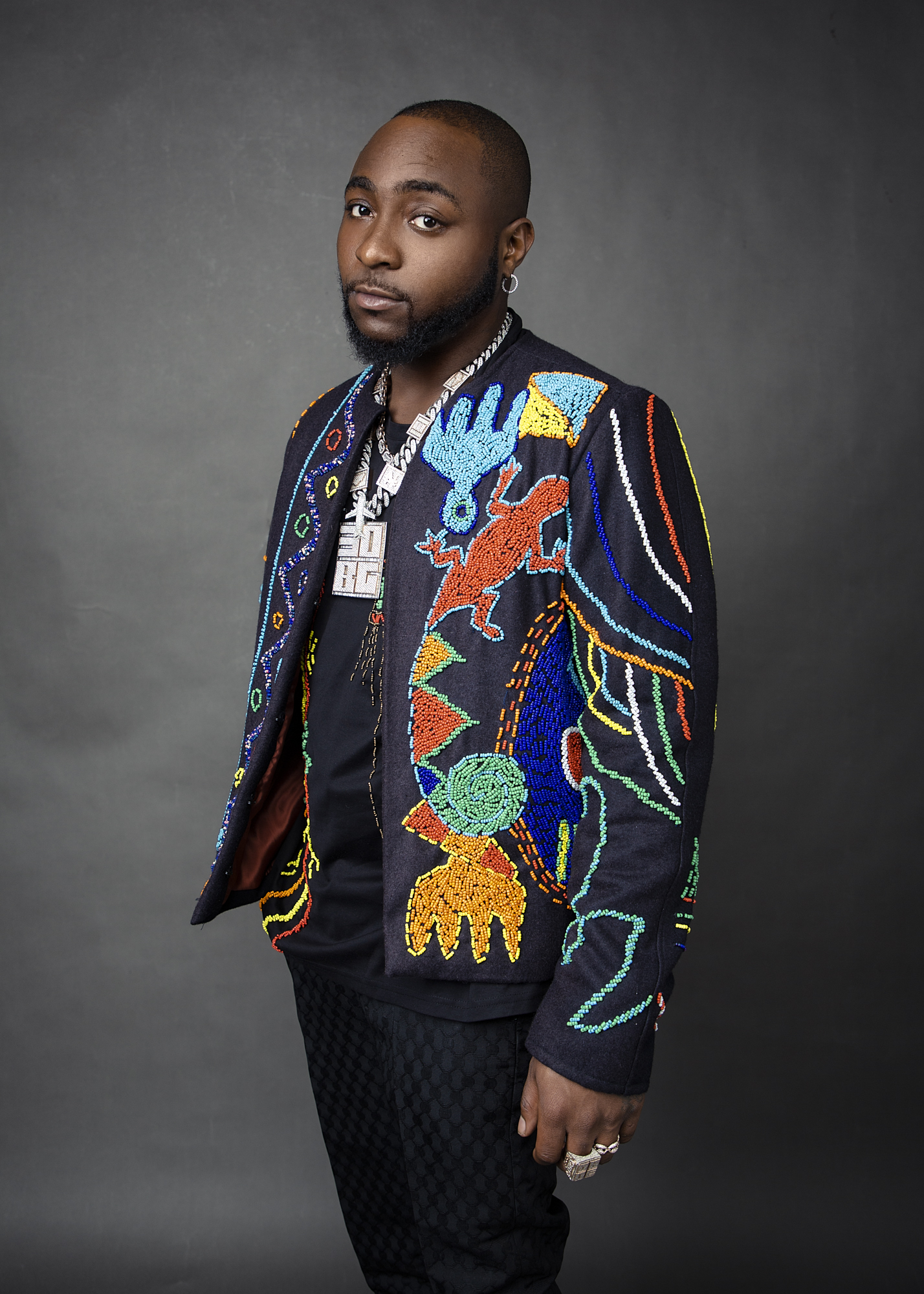Davido Talks His New Album, #EndSARS Protests and Making Music in Lockdown
The Afrobeats trailblazer raised the bar yet again with the release of his sophomore album, “A Better Time,” today.

Before the pandemic drove the urban masses from all over the world out of clubs, bars and restaurants and into their homes indefinitely, it would have been an uncommon occurrence to spend a night out without hearing Davido’s music somewhere in the background. A pioneer of the Afrobeats genre, the American-Nigerian singer and songwriter makes music for people to feel good to. It’s about smooth beats and funky rhythms, Davido’s rich vocals inviting club-goers and party attendees to have, as his debut album advertises, A Good Time.
To say the artist would be on the rise would be an understatement entirely—he’s been rising, having reached incredible heights with over a billion streams on A Good Time, the position of being the most followed African on Instagram with over 18 million followers, and accomplishments that include a Billboard cover, a headline in the O2 Arena and Africa Day benefit concert headline to benefit COVID-19 research. But a peak in the Afrobeats icon’s career would imply that the rest is downhill, and as his new album A Better Time proves, that isn’t remotely the case. With features from Nicki Minaj, Lil Baby, Chris Brown, NAS, and Young Thug, the second installation of Davido’s discography is a testament to his creative ability and mastery of sound and skill as an artist, an overlap of genres, and an ode to the beauty of a craft borne of the pandemic.
Below, Davido talks about A Better Time, the #EndSARS protests he’s been participating in Nigeria and the influences of lockdown and the pandemic on his Afrobeats sound. Read on for the full interview and stream A Better Time on all platforms now.

VMAN: So, what’s been going on in the past few months, how has your quarantine been going?
DAVIDO: It was crazy. It was crazy. Funny enough, I was on tour when the whole thing happened. I had done 6 shows out of like 23. It was just crazy. It was just surreal having to cancel the whole tour because, you know, in my generation, I don’t think there’s anything—we’ve frozen the world the way COVID-19 came and just stuck. It stopped everything at once, it was kind of mind-blowing for me.
VM: Do you have plans to resume the tour after a while?
D: Yeah, definitely. 2021 we’re looking at, but you know, these days, anything is possible. You know, so we’re just hoping for the best. I adapted to the new way of living. I’m sure if there was no COVID-19, I’d probably be doing this interview face-to-face, so we’re learning to live with it.
VM: What about you personally, though? Did you pick up any new hobbies or interests or anything during the lockdown?
D: I wouldn’t say new hobbies, but I think I’ve been more concentrated on this recording. I definitely have more time to be in the studio rather than just, you know, being on the road and being in the studio at the same time. There’s really nowhere to go, I’m not as busy as I would be. So this is really needed, more time in the studio producing music. I just signed two new artists, so just working on them as well and then, you know, getting ready to put out the album as well, obviously. So it’ll be just a lot of other things that I’m getting myself involved in. I just started this app, I just partnered with some people to start this money transfer app. So just, you know, involving myself in different things to keep myself busy.
VM: Tell me a little bit more about the app, if you can, if it’s not under wraps still?
D: You know you have like Zelle and Cash App? It’s just like exactly the same thing. But those things don’t work in Nigeria, they don’t work in Africa. So it’s Cash App, Zelle, but it does more, you can transfer Bitcoin and cryptocurrency, you could pay your bills. You know, a lot of things that Africa is lacking, I’m trying to provide, well, we are trying to provide as well, so that’s pretty cool.
VM: Oh, wow. That’s fantastic. So before we start talking about the new album you’re putting out, let’s chat a little bit about what you’ve already done. A Good Time recently hit over a billion streams, which is just so incredible. That’s such an overwhelming number, so how does it feel?
D: Man, it’s crazy. Like, just from recording the first song, to…you know, you know, when I first heard the news, I just remembered the first song I recorded off the album, which was “If,” and it’s just actually catchy. “If” or “Get to You,” I’m not sure. So it was just crazy, like you never know where anything leads you to. Like, what if I didn’t apply myself and stay at it? I wouldn’t have ever taken that. You know what I’m saying? So I’m just happy that, you know, everybody around supported me, supported the music and a lot of people were involved. The good thing about it is that a lot of people were involved in the album, which just makes it crazier because everybody gets that same recognition I got.
VM: Are you going to keep in line with that with your next album and have it be a really collaborative project, or are you going to go in a different direction?
D: It’s a different kind of album, if you ask me. Like I said, I had more time recording the album. I feel like I put more into this album than my last album. The last album was called A Good Time, and this album is called A Better Time, which, the title already just explained that it’s a better album. I took my time on it. It was just all vibes. Nothing was really clad with the album. I didn’t even plan to drop an album so early after A Good Time, but you know what I’m saying? God just did it that way. ‘Cause I was just on lockdown. I was just recording music and recording music again, you know, I just want to give the people good music.

VM: Yeah, definitely. So you were also on the cover of Billboard not too long ago as a pioneer of the Afrobeats movement. And you have two BET awards, over 17 million Instagram followers, a headline in the O2 arena…you’ve really racked up quite an impressive card. Can you tell me a little bit about your rise in the industry, where it all started to where you are now?
D: I mean, it’s just crazy. In life you just hit different milestones that you think, yo, this is it. I made it. And then, you hit another one. You’re like, damn, that’s just been the case for me. It’s just been, I wouldn’t say luck, but I say, grace, you know what I’m saying? I just thank God that, you know, I have the opportunity to just be able to rise and rise and rise. Just keep, keep elevating and just inspiring other people and getting inspired too by my fellow African artists as well. So it’s just like, I’m just happy everything’s coming together, especially when you didn’t plan it, you know?
VM: Yeah, that’s such a good mindset to have. So while we’re also talking about what you’ve been doing lately, you recently met with the Inspector General of Police to discuss the end of the Special Armed Robbery Squad, which is so amazing. It’s such a good cause. Can you tell me a little bit about that?
D: I mean, it’s just crazy because this has been—first of all, it’s way beyond SARS when it comes to the country and its problems. But you know, SARS was a section of the police force that kept robbing citizens and harassing citizens, just because they had the power to, which they didn’t even have the power to. Even ended up in killing a lot of people. This is the first time in my generation I’ve seen this happen. And the government is very aware and it’s so crazy that it’s not—we’re like, you know what, we didn’t put that right there. The power is so bad is that they don’t even know what to do. That’s the fucking thing, like they listen, but they just shoot bullets. They don’t know what to do.
VM: What was it like when you met with the Inspector General?
D: I mean, I met with him and I just thought…honestly, it was kind of crazy because after a while people were saying I was trying to make it about me. I’m like, yo, I’m not trying to make it about me. I went on Twitter. I said to everybody, I was like, ‘I have a way to get to the Inspector General. Let’s all go, all my fellow artists, you know what I’m saying? Let’s all go. Let’s get on the plane together and go meet this guy together.’ So I didn’t meet anybody there, per se, it was me, my manager and my sister as the audience. I just explained to him exactly what the people wanted. And he explained that they would act on it, and I wouldn’t say I left that satisfied, but at least I went there to relay my message because I had the opportunity to see him. You know what I’m saying? I’ve been in the office, I’ve been on the street protesting, you know what I’m saying? So I’ve been to both sides of the whole thing, so it was just crazy. And while we still haven’t seen no change, it is just way more than SARS. It’s the government, the electoral system that they keep rigging people. The people’s votes do not count. You know what I’m saying? It’s just a lot.
VM: I’m surprised people were accusing you of making it about yourself. I mean, I think it’s so important that when you have a platform like this and you have the power and the privilege to do something, you do it and that’s exactly what you did. So that’s really great.
D: Things like this, people are very, very emotional, so I understand how, you know, it could come off that way.

VM: So to shift gears a little bit, let’s talk about your music. So the first single from your new album, “FEM,” was released. What inspired you to produce that song?
D: Honestly it was just, at that moment, there was just a lot going on with me and people just talking, saying a lot about me. It’s always been a thing that like, when they put me in a tabloid or somebody says this and somebody says that, you know, instead of…I’m a musician, right? So I’ll go to the studio and just speak my mind. And that was really it. And, you know, I took a little break for like four months and I came back to that song and it really just stuck well. And it’s like at all of the protests right now, they’re playing it. Craziness. ‘Cause it means “keep quiet.”
VM: Tell me about A Better Time—what can we look forward to on it? Is it really different, do you think, than A Good Time?
D: I mean, it’s way different from A Good Time. It has all genres on it, hip hop, RnB. I have Afrobeats, everything, Dancehall, reggae, everything you can imagine is on the album. So whatever genres you like, it’s on there.
VM: What was the process of recording it like? It’s pretty unprecedented to record a whole album in lockdown.
D: I mostly recorded it during the lockdown, so I really had time to concentrate with my producers, and I love recording in Nigeria. I prefer recording in Nigeria. The only things I really recorded in America was like the songs with Chris [Brown], the song with NAS. The song with [Lil] Baby I recorded in Atlanta and the song with Nicki [Minaj], I recorded it in Nigeria and I sent it to her, but the rest of it was recorded in Nigeria and I prefer to record in Nigeria.
VM: So are you basically spending most of your time in Nigeria now or kind of going back and forth?
D: I just came back from LA like a month ago, but yeah, I prefer spending my time in Nigeria, if you ask me.

VM: As an Afrobeats artist, you’re really leading your genre right now and pretty much setting the bar for everyone who comes after you. With that in mind, when your fans and your fellow rappers listen to your new album, what do you want them to take away from it?
D: I mean, not to take away credit from others. A lot of artists is doing their thing too, and it’s just like, with me, I kind of like taking things into my own hands with just like doing extra promotion, just trying to push the whole culture. You know what I’m saying? It hasn’t been easy for me because I remember when I first came to America, they didn’t really take me serious, but now like they started taking me serious, you know what I’m saying? So it was a good time to drop music, especially for me, you know?
VM: What do you think sparked that shift when they didn’t take you seriously to now when they really do?
D: I don’t know. [laughs] It just happened naturally. Shoutout to London, shoutout to New York, shoutout to Atlanta, Houston, Dallas, Europe, Paris France, you know, all those places have like a lot of African people. So it just spread, I think.
VM: Yeah. I was in London in spring. I was living there for a little bit before lockdown and I mean, every club you went to, no matter what time of night, what day of the week, at least one of your songs would be bumped by the DJ, you know, they’re really representing.
D: [laughs] Yeah, that’s crazy!
VM: Is there anything else you want to add at all? Anything you want people to know about the album?
D: Yeah. Just for people to just all over the world, even you guys over there, your platform’s a good platform to help us, you know, let our voices be heard here in Nigeria, whatever you guys can do to help us. And for the album, for people just to enjoy the album and enjoy good music.
Discover More
